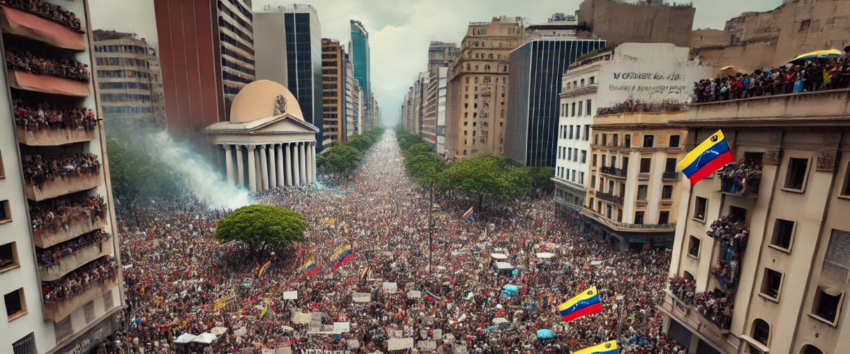| Listen to our audio presentation: History of the US Supreme Court |
Venezuela is currently experiencing significant political unrest following the controversial re-election of President Nicolás Maduro. The election, which took place on Sunday, has been marred by widespread allegations of fraud, leading to mass protests and escalating tensions throughout the country.
Election Controversy
On Monday, the National Electoral Council (CNE) certified Maduro’s re-election, declaring him the winner with 51% of the vote, followed by opposition candidate Edmundo González with 44%. The opposition, however, has accused the electoral body of being biased towards the ruling United Socialist Party of Venezuela (PSUV), which has held power for 25 years. Allegations of irregularities in the vote counting process have surfaced, with claims that opposition witnesses were denied access to polling stations and that some votes were deliberately not processed.
Protests and Violence
Thousands of Venezuelans have taken to the streets to protest against what they perceive as a fraudulent election. In the capital city of Caracas, security forces used tear gas to disperse crowds of demonstrators who marched down the main thoroughfares, banging pots and pans in a traditional form of protest. In three cities, statues of former President Hugo Chávez, Maduro’s mentor and predecessor, were toppled by angry protesters wielding sledgehammers.
President Maduro has condemned the protests, describing them as violent terrorist attacks orchestrated by the opposition. He claimed that over 100 such attacks had occurred and accused the opposition of attempting to incite a coup d’état. Maduro also alleged that the electoral process was targeted by a failed massive hack.
Opposition Response
The opposition, led by María Corina Machado and Edmundo González, has vehemently rejected the election results. Machado, in an interview with The Guardian, stated that Maduro should accept his defeat and that his departure from power is inevitable. She pointed out that her coalition had obtained 73.2% of the voting tallies from polling stations, which they believe proves their victory.
Machado emphasized that Maduro’s rule has led Venezuela into a severe economic and humanitarian crisis, forcing millions to flee the country. She argued that the president’s claim of an irreversible victory is unfounded and that the opposition’s win is indisputable.
International Doubts and Historical Context
The international community has expressed doubts over the legitimacy of Maduro’s victory. The BBC highlighted the longstanding dominance of the PSUV, noting that the party’s control over key institutions such as the National Assembly, the Supreme Tribunal of Justice, and the National Electoral Council has significantly undermined democracy in Venezuela. The PSUV-led coalition’s almost total control of the legislature has facilitated Maduro’s repressive and anti-democratic governance.
The opposition’s decision to unite behind a single candidate, Edmundo González, marks a significant shift from previous strategies of boycotting elections deemed unfair. This united front, coupled with opinion polls suggesting González’s overwhelming lead, has given the opposition hope that they can overcome government attempts to rig the election.

